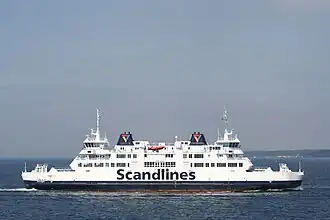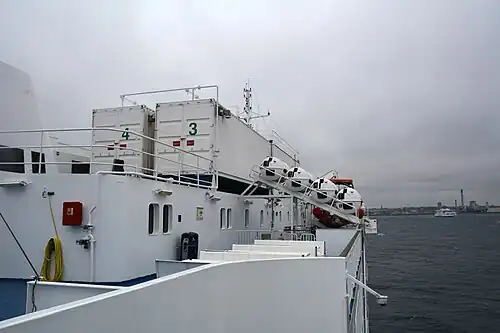MF Tycho Brahe
 Tycho Brahe in 2007
| |
| History | |
|---|---|
| Name | 1991–present: Tycho Brahe |
| Operator |
|
| Port of registry | 1991 onwards: Helsingør, |
| Builder | Langsten Slip & Båtbyggeri, Tomrefjord, Norway |
| Yard number | 156 |
| Launched | 19 January 1991 |
| Identification | IMO number: 9007116[1] |
| Status | In service |
| General characteristics | |
| Tonnage | 11,148 GT[2] |
| Length | 111.20 m (364 ft 10 in)[2] |
| Beam | 28.20 m (92 ft 6 in)[2] |
| Draught | 5.50 m (18 ft 1 in)[2] |
| Installed power | Electric 6.4 MWh battery |
| Propulsion | 4 × 1.5 MW (2,000 hp) |
| Speed | 10.5 knots (19.4 km/h; 12.1 mph) — 14.5 knots (26.9 km/h; 16.7 mph) max[2] |
| Capacity |
|
MF Tycho Brahe is a Danish battery-electric car-ferry owned by Øresundslinjen that operates on the 5 km (3.1 mi) HH Ferry route. It started as a diesel ferry in 1991. The ship is bidirectional, which means it can change direction without turning around, so no time is lost for this. The ship is also able to accelerate and decelerate quite quickly to and from her maximum speed of 14 knots.
The ship is named after the Danish astronomer Tycho Brahe. MF Tycho Brahe was built by Langsten Slip & Båtbyggeri in Tomrefjord, Norway. The ship is owned and operated by Øresundslinjen, performing 46 trips per day. Between 1991 and 1997, Tycho Brahe was owned by DSB Rederi.
The ferry can carry 1250 passengers, and either 260 trucks, 240 cars or 9 passenger train coaches at one time. It was built with three railtracks inside, with a total length of 266 meters.
Conversion to electric
Tycho Brahe has a sister ship, M/S Aurora af Helsingborg. The two ships were originally diesel-powered, but were converted in 2018 to electric propulsion with a 4 MWh battery, weighing 57 metric tonnes, located at the top of the ferry between the chimneys.[3][4] Two of the four Wärtsilä-Vasa 6R32E diesel engines have been removed from each ship, with the other two as a backup system if battery state of charge drops to 30%, not for daily operation.[5][6] The batteries were upgraded to 6.4 MWh in 2022,[7] and are recharged from land by a robot arm when docked,[8] at 10.5 MW (10.5 kV, 600 A) for 6 minutes in Denmark and 9 minutes in Sweden. Over the years, more than 50,000 charging connections have been made.[6] Each trip uses about 1,175 kWh and is scheduled to last 20 minutes at 10.5 knots similarly to the diesel ferries.[9] Refrigerator trucks are supplied with power. Each ferry has 600 kW combined power supply for eight charge points for plug-in electric vehicles during the trip.[10]
Main specifications:
- Length: 111 m/364 ft 2 in
- Beam: 28,2 m/92 ft 6 in
- Draft: 5,7 m/18 ft 8 in
- Tonnage: 12000 gt
- Machinery: 4 thrusters of 1.5 MW each. 6.4 MWh Li-ion batteries. Backup system: two-shaft, diesel, 3350 hp
- Tycho Brahe after conversion
-
.jpg) Tycho Brahe in 2018
Tycho Brahe in 2018 -
 Batteries on top
Batteries on top -
.jpg) Tycho Brahe in 2019
Tycho Brahe in 2019
Gallery
-
 At sea
At sea -
.jpg) In dock
In dock -
 Robot charger
Robot charger
References
- ^ Faktaomfartyg.se "M/S Tycho Brahe", accessed 21 April 2011
- ^ a b c d e "Tycho Brahe". www.scandlines.com. Retrieved 7 February 2021.
- ^ Moore, Rebecca (9 January 2020). "ForSea Ferries battery conversion: a 'big little journey'". Riviera. Archived from the original on 20 October 2020.
The batteries are placed in four containers between the chimneys. The 640 water-cooled lithium Ion battery modules have a total weight of 57 tonnes, with a total weight for the installation of 270 tonnes.
- ^ "Electric Ferry".
- ^ "89 tonn batterier i verdens største el-ferge". 27 June 2016.
- ^ a b "ForSea sets the pace as decarbonization pioneer | ABB". 12 April 2023.
The complete energy storage solution comprises four ABB e-House containers, two housing the Corvus batteries and two housing electrical equipment, drives and cooling equipment.
- ^ "ForSea's TYCHO BRAHE is now upgraded with the world's largest battery pack". Shippax. 21 October 2022.
- ^ "Two massive ferries are about to become the biggest all-electric ships in the world". 24 August 2017.
- ^ "Sustainability". ForSea Ferries. Archived from the original on 23 June 2019.
- ^ Baker, Elizabeth (14 November 2023). "Marine Charging Point takes part in installation of onboard DC EV charging systems on two Öresundslinjen ferries". Electric Hybrid Marine Technology.
- The Encyclopedia of ships. General editor: Tony Gibbons. Silverdale books, 2002, ISBN 1-85605-591-4. Page 216.
External links
![]() Media related to Tycho Brahe (ship, 1991) at Wikimedia Commons
Media related to Tycho Brahe (ship, 1991) at Wikimedia Commons
- M/F Tycho Brahe
- Forsea ferries
- Fully charged show on electric ferries
- Electrek: Two massive ferries are about to become the biggest all-electric ships in the world